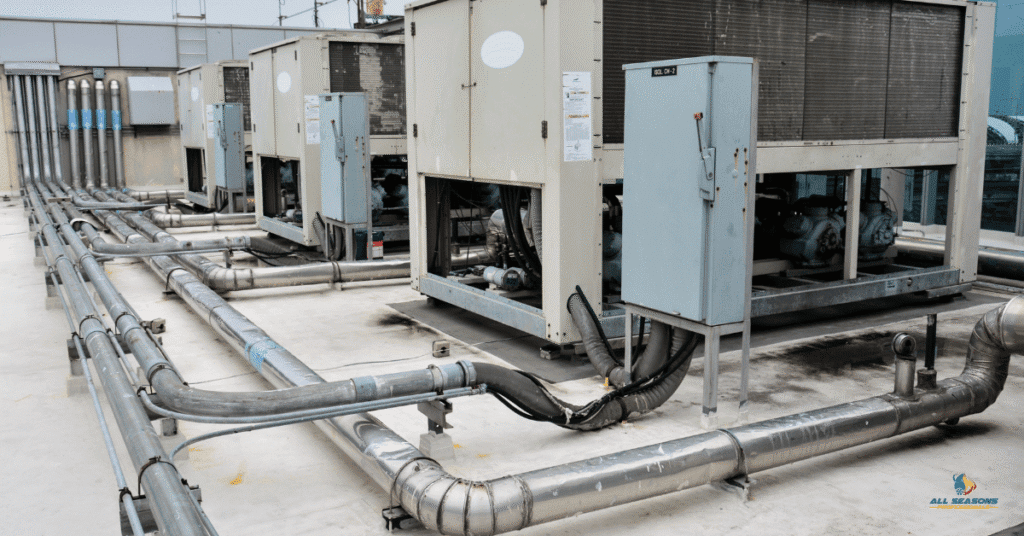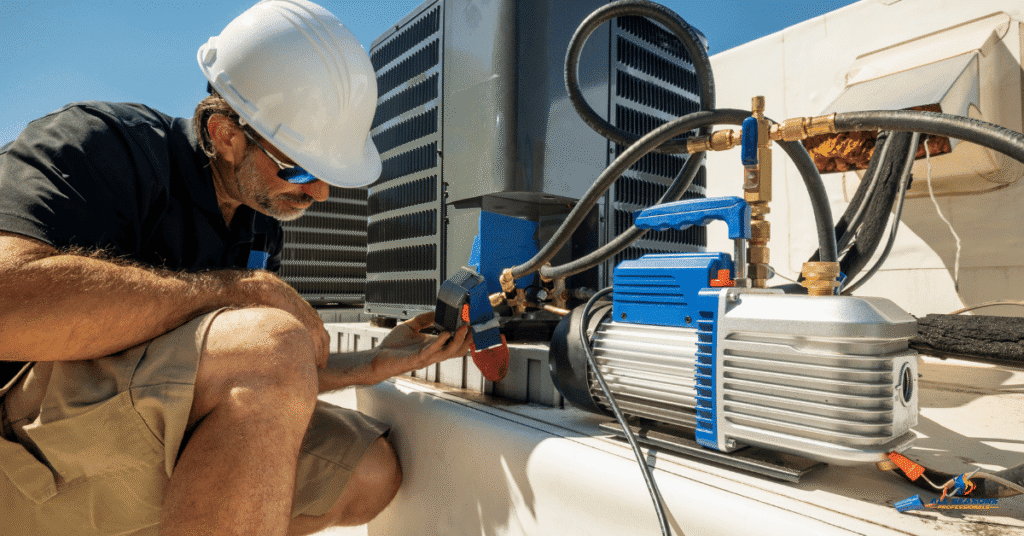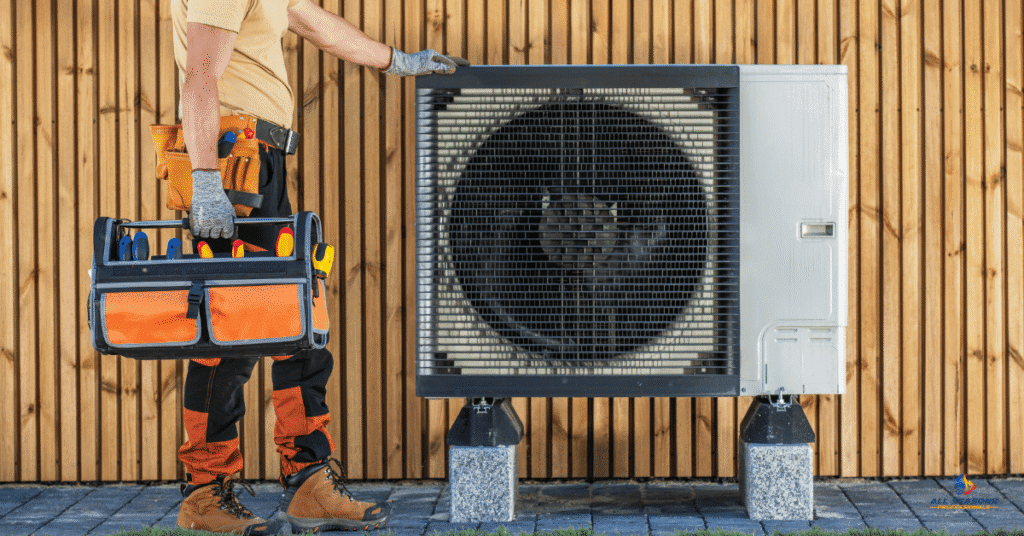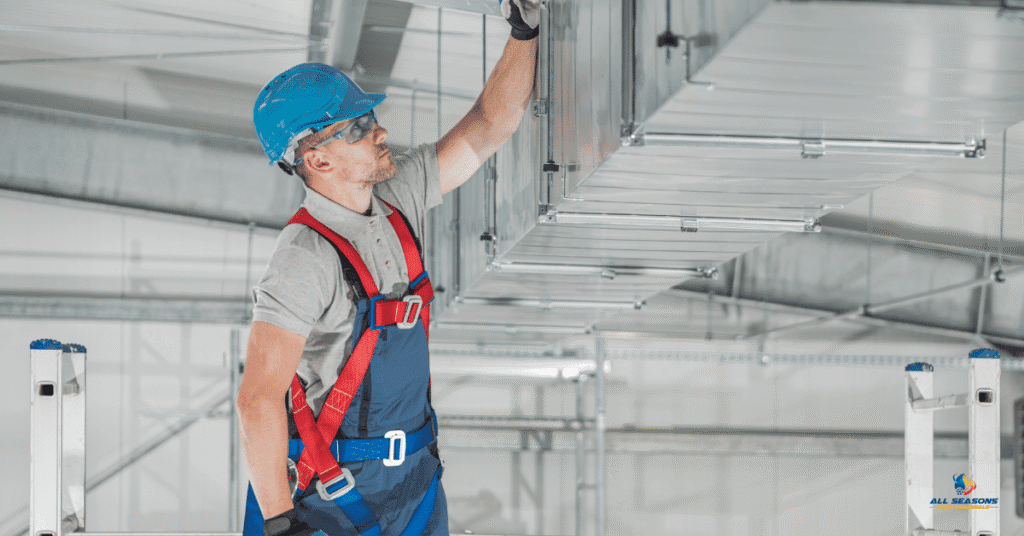Choosing the right HVAC system for your building starts with understanding the differences between residential and commercial HVAC systems. This guide covers everything from the size of the system and zoning control to maintenance, cleaning, and installation needs. Whether you’re outfitting a home or a commercial building, we break down what matters most when selecting an HVAC system.
What Is an HVAC System?
An HVAC system (Heating, Ventilation, and Air Conditioning) regulates temperature, airflow, and humidity inside residential and commercial buildings. It includes:
- Heating units (furnaces, boilers, heat pumps)
- Air conditioners or cooling systems
- Ventilation equipment for air quality control
These systems are essential in both residential properties and commercial buildings, though their design and functionality differ significantly.
Key Functions of HVAC Systems
- Deliver heating and cooling across defined spaces
- Filter and circulate indoor air
- Manage humidity for indoor comfort and health
Despite similar goals, the systems differ in their structure, capacity, and performance across residential vs commercial HVAC systems.
What Are the Main Differences Between Residential and Commercial HVAC?
The difference between residential and commercial HVAC systems is driven by factors such as the size of the system, operating hours, zoning needs, and long-term durability.

How Does the Size of the System Affect Performance?
A critical distinction lies in the size of the system. Here’s a table highlighting the differences:
Size and Capacity Comparison
| Category | Residential HVAC System | Commercial HVAC System |
|---|---|---|
| Typical Size | Small to medium | Significantly larger |
| Area Coverage | Few rooms | Multiple floors or zones |
| Usage | Intermittent | Continuous, heavy-duty |
How Does Installation Differ Between Residential and Commercial HVAC?
- Residential HVAC installation is quicker and often standardized with split systems
- Commercial HVAC installation requires detailed planning, larger hvac units, and ductwork design
Key tasks involved:
- Equipment sizing and layout planning
- Rooftop setup (commercial) or outdoor wall mounting (residential)
- Zoning and sensor integration
- Coordination with HVAC technicians, builders, and electricians
Are There Differences in HVAC Equipment?
Yes. Let’s look at the equipment-based comparison:
HVAC Equipment Comparison
| Equipment Feature | Residential HVAC | Commercial HVAC |
|---|---|---|
| Design | Standard and compact | Modular and scalable |
| Control | Basic thermostats | Advanced zoning, smart sensors |
| Power | Less powerful | High capacity |
| Modularity | Fixed configuration | Custom and upgradeable systems |
What’s the Difference in HVAC Maintenance?
HVAC maintenance varies in scope and frequency:
Residential HVAC maintenance includes:
- Filter cleaning
- Seasonal checks
- Minor repairs
Commercial HVAC maintenance includes:
- Software updates and system recalibration
- Coil and duct cleaning
- Electrical diagnostics
Due to the complexity of commercial HVAC systems, only trained commercial HVAC techs should handle maintenance.

Do HVAC Systems Differ in Zoning and Control?
Yes, zoning differs greatly.
Residential HVAC systems:
- Use 1 to 2 thermostats
- Limited zoning options
Commercial HVAC systems:
- Feature smart zoning
- Occupancy sensors
- Automated temperature management
What’s the Cost Difference Between Residential vs Commercial HVAC?
Cost and Service Comparison
| Factor | Residential HVAC | Commercial HVAC |
|---|---|---|
| Installation Cost | Lower | Higher due to complexity |
| Repair Cost | Moderate | Expensive due to system scale |
| Maintenance Plan | Basic and seasonal | Year-round detailed service |
| Lifespan | 10 to 15 years | 15 to 25 years |
Who Installs and Services These Systems?
Residential HVAC technicians:
- Handle homes and residential properties
- Perform repair, cleaning, and upgrades
Commercial HVAC technicians:
- Handle larger, complex systems
- Require special certifications

Are HVAC Needs Different for Residential vs Commercial?
Yes, HVAC systems are often designed based on:
- Building use (home vs school vs office)
- Operating hours (residential: limited, commercial: extended)
- Ventilation and air quality requirements (stricter in commercial)
Market Trends in Residential vs Commercial HVAC
- The global residential HVAC sector contributes a large percent of the total HVAC market
- Increased demand for energy-efficient and smart residential HVAC services
- Commercial HVAC systems are advancing with AI controls and zoning tech
- HVAC workers are needed in both sectors, but commercial HVAC requires specialized education
What Types of HVAC Systems Are Common?
HVAC System Types
| Type | Residential Use | Commercial Use |
|---|---|---|
| Split Systems | Yes | No |
| Packaged Rooftop Units | No | Yes |
| Heat Pumps | Yes | Yes |
| Mini Splits (Ductless) | Yes | Yes |
| VRF (Variable Refrigerant Flow) | No | Yes |
Cleaning and Repair: Key Point
- Residential HVAC cleaning involves air filters, vents, and basic coil cleaning
- Commercial HVAC cleaning includes deep duct cleaning and smart system reset
- Repair needs are higher in commercial units due to heavy usage
- Proper installation, regular cleaning, and timely repairs are critical

Final Thoughts on Residential vs Commercial HVAC Systems
The differences between commercial and residential HVAC systems go beyond size. From installation and zoning to cleaning, repair, and technician expertise, each system type has specific needs. Understanding these helps ensure you select the right HVAC solution for comfort, efficiency, and durability.




